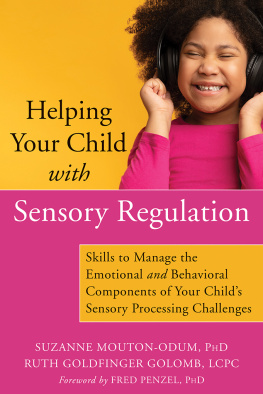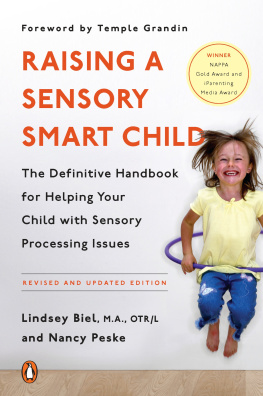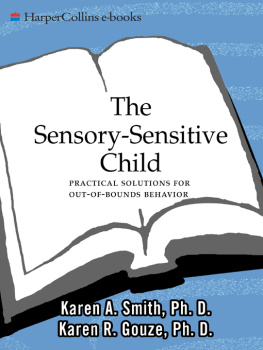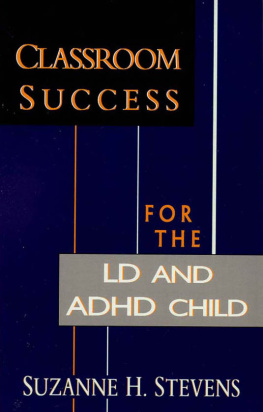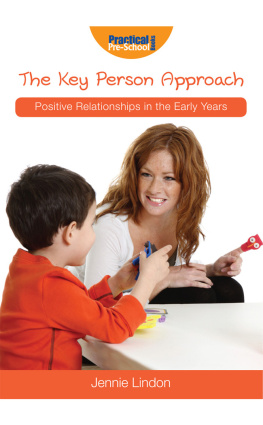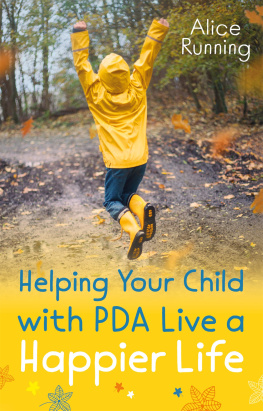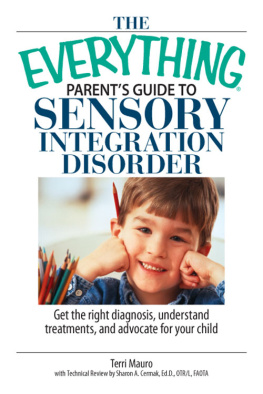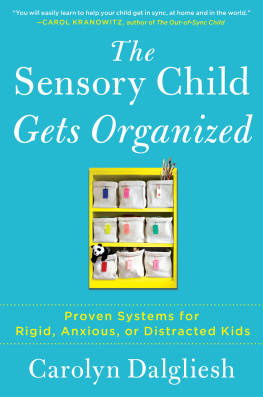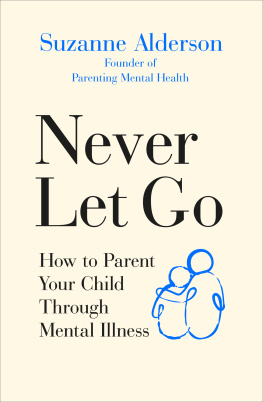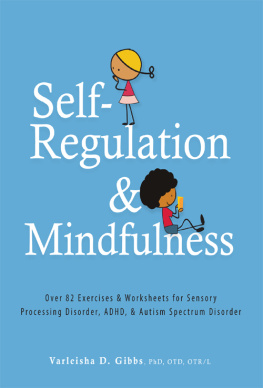Suzanne Mouton-Odum - Helping Your Child with Sensory Regulation
Here you can read online Suzanne Mouton-Odum - Helping Your Child with Sensory Regulation full text of the book (entire story) in english for free. Download pdf and epub, get meaning, cover and reviews about this ebook. year: 2021, genre: Children. Description of the work, (preface) as well as reviews are available. Best literature library LitArk.com created for fans of good reading and offers a wide selection of genres:
Romance novel
Science fiction
Adventure
Detective
Science
History
Home and family
Prose
Art
Politics
Computer
Non-fiction
Religion
Business
Children
Humor
Choose a favorite category and find really read worthwhile books. Enjoy immersion in the world of imagination, feel the emotions of the characters or learn something new for yourself, make an fascinating discovery.
- Book:Helping Your Child with Sensory Regulation
- Author:
- Genre:
- Year:2021
- Rating:3 / 5
- Favourites:Add to favourites
- Your mark:
- 60
- 1
- 2
- 3
- 4
- 5
Helping Your Child with Sensory Regulation: summary, description and annotation
We offer to read an annotation, description, summary or preface (depends on what the author of the book "Helping Your Child with Sensory Regulation" wrote himself). If you haven't found the necessary information about the book — write in the comments, we will try to find it.
Helping Your Child with Sensory Regulation — read online for free the complete book (whole text) full work
Below is the text of the book, divided by pages. System saving the place of the last page read, allows you to conveniently read the book "Helping Your Child with Sensory Regulation" online for free, without having to search again every time where you left off. Put a bookmark, and you can go to the page where you finished reading at any time.
Font size:
Interval:
Bookmark:

Helping Your Child with Sensory Regulation is a tremendous resource for parents of children whose nervous systems result in behaviors that may be challenging and exasperating. The authors walk readers through relatable examples of how attempts to self-regulate can lead to behaviors that appear odd, mimic psychiatric disorders, or appear willfully defiant, and they provide accessible and effective solutions. All parents will find useful guidance in this practical book.
Britt Rathbone, MSSW, LCSW-C , adolescent therapist, and coauthor of Dialectical Behavior Therapy for At-Risk Adolescents , What Works with Teens , and Parenting a Teen Who Has Intense Emotions
This outstanding resource for parents of children with sensory dysregulation represents an extraordinary combination of the authors extensive knowledge and their ability to present complex issues in easily understandable language. Engaging clinical vignettes and self-awareness exercises facilitate understanding of how sensory dysregulation might be experienced and observed, and evidence-based principles of behavioral treatments drive presentation of practical and helpful coping strategies to improve parent and child satisfaction with life.
Melinda A. Stanley, PhD , distinguished emeritus professor of psychiatry and behavioral sciences at Baylor College of Medicine; and coauthor of a leading textbook, Abnormal Psychology
This book is a gem! At once both comprehensive and practical, it is filled with pearls of wisdom amassed over decades of clinical experience with children and families. Written by two of the fields finest clinicians, it is rooted in the best-available science and crafted in a manner that is accessible and relatable for parents. Mouton-Odum and Goldfinger Golomb understand the parent perspective so well, and they write with compassion while delivering sound, solid advice. I look forward to sharing this resource with my own trainees, colleagues, and patients.
Tara S. Peris, PhD , associate professor of psychiatry and biobehavioral sciences at the UCLA Semel Institute, and program director of the UCLA ABC Partial Hospitalization Program
Ruth Goldfinger Golomb and Suzanne Mouton-Odum are two of the most experienced and thoughtful therapists in practice. Here, they tear apart the complex emotional and behavioral results of sensory sensitivity, and provide case studies to translate these ideas into real life. Parents seeking help for their child will find practical advice and tools, and the relief of many aha moments of self-recognition. Importantly, theyll also receive the additional, vital gift of workable self-care strategies for themselves.
Jennifer Raikes , executive director of The TLC Foundation for Body-Focused Repetitive Behaviors; and director of Bad Hair Life , a documentary about living with trichotillomania
This book is a breath of fresh air for parents who have been struggling to understand how to help their children who have sensory struggles. Not only have the authors provided easy-to-understand explanations of why your child is struggling, they also give step-by-step and easy-to-follow guidance on how to increase your childs ability to cope and be more functional in the face of their sensory triggers.
Litsa Tanner, MS, MFT , cofounder of the Santa Rosa Center for Cognitive Behavioral Therapy, and adjunct faculty member at the University of San Francisco
This book provides welcome guidance for parents whose children have problems regulating their sensory world. The authors cast a bright light on a poorly understood contributor to common family problems, and to many clinical disorders as well. In plain language, readers are helped to understand the nature of these problems, and to develop a practical and scientifically sound plan for helping children manage their uncooperative sensory systems.
Charles S. Mansueto, PhD , founder and director of the Behavior Therapy Center of Greater Washington in Silver Spring, MDa leading center for the treatment of obsessive-compulsive and related disorders
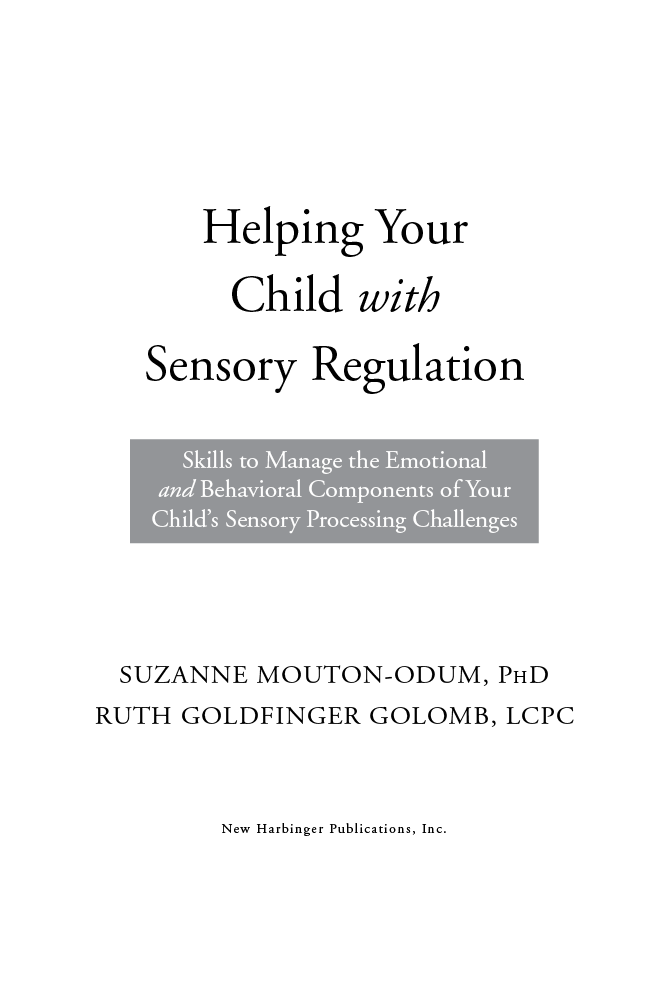
This book is dedicated to all of the children and families we have met and worked with who live with sensory regulation issues. You inspire us every day and have helped us develop compassionate, supportive, and creative ways to help you live sensational lives!
Publishers Note
This publication is designed to provide accurate and authoritative information in regard to the subject matter covered. It is sold with the understanding that the publisher is not engaged in rendering psychological, financial, legal, or other professional services. If expert assistance or counseling is needed, the services of a competent professional should be sought.
Distributed in Canada by Raincoast Books
Copyright 2021 by Suzanne Mouton-Odum and Ruth Goldfinger Golomb
New Harbinger Publications, Inc.
5674 Shattuck Avenue
Oakland, CA 94609
www.newharbinger.com
Sensory Processing Disorder Checklist reproduced from Psychological Inter-ventions for Children with Sensory Dysregulation by Ruth Golomb and Suzanne Mouton-Odum. 2016 by the Guilford Press.
Cover design by Amy Daniel; Acquired by Tesilya Hanauer; Edited by Jennifer Eastman
All Rights Reserved
Library of Congress Cataloging-in-Publication Data
Names: Mouton-Odum, Suzanne, author. | Golomb, Ruth Goldfinger, author. | Penzel, Fred, author.
Title: Helping your child with sensory regulation : skills to manage the emotional and behavioral components of your childs sensory processing challenges / by Suzanne Mouton-Odum, PhD. and Ruth Golomb, Fred Penzel, LCPC.
Description: Oakland, CA : New Harbinger Publications, [2021] | Includes bibliographical references.
Identifiers: LCCN 2020040278 (print) | LCCN 2020040279 (ebook) | ISBN 9781684036264 (trade paperback) | ISBN 9781684036271 (pdf) | ISBN 9781684036288 (epub)
Subjects: LCSH: Sensory integration dysfunction in children. | Sensory disorders in children--Treatment.
Classification: LCC RJ496.S44 M68 2021 (print) | LCC RJ496.S44 (ebook) | DDC 618.92/8--dc23
LC record available at https://lccn.loc.gov/2020040278
LC ebook record available at https://lccn.loc.gov/2020040279
Contents
Foreword
As a cognitive behavioral psychologist and the parent of an autistic person, I have long been acquainted with sensory issues in both children and adults. When I first began treating people, nearly forty years ago, we had no real understanding of or names for these problems, nor did we have any evidence-based techniques to use with those who came to us seeking help. Many practitioners with older-type training looked at these individuals and simply assumed their problems were purely psychological and that they could somehow be talked or medicated out of them. Some parents got no better answer than the old Theyll grow out of it. This left the vast majority of these folks with nowhere to turn and with no explanation for what was happening to them.
Since that time, there has been a gradual increase in our knowledge of problems involving the nervous system and how to treat them. This is not to say that our understanding is by any means complete or that newer, more effective treatments have yet to be developed. It almost seems that the more we learn about the brain and the rest of the nervous system, the more we find that we do not know. In the meantime, however, we do seem to be more effective in treating sensory problems and are constantly at work in our attempts to do even better.
Font size:
Interval:
Bookmark:
Similar books «Helping Your Child with Sensory Regulation»
Look at similar books to Helping Your Child with Sensory Regulation. We have selected literature similar in name and meaning in the hope of providing readers with more options to find new, interesting, not yet read works.
Discussion, reviews of the book Helping Your Child with Sensory Regulation and just readers' own opinions. Leave your comments, write what you think about the work, its meaning or the main characters. Specify what exactly you liked and what you didn't like, and why you think so.

